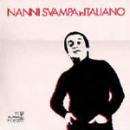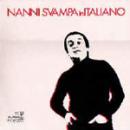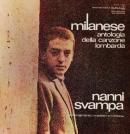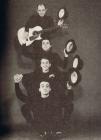Sèmm in vun, sèmm in du,
sèmm amis tucc e du.
Sèmm in du, sèmm in tri,
tucc e tri stèss partì.
Sèmm in tri, sèmm in quàtter,
tucc e quàtter stèss caràtter.
sèmm in quàtter, sèmm in cinch,
'ndèmm in gir a vend i stringh.
Sèmm in cinch, sèmm in ses,
me piàsen i scires.
Sèmm in ses, sèmm in sètt,
'ndèmm in gir a vend corsètt.
Sèmm in sètt, sèmm in vòtt,
me pias el risòtt.
Sèmm in vòtt, sèmm in noeuv,
'ndèmm in gir a vend i oeuv.
Sèmm in noeuv, sèmm in des,
tucc e des stèss paes.
La strada l'è longa, ci tocca marciar.
Firolì firolà, da bravi soldà.
Firolì firolà, da bravi soldà.
Firolì firolà, da bravi soldà.
La strada l'è longa, ci tocca marciar.
Sèmm in des, sèmm in noeuv,
'ndèmm in gir a vend i oeuv.
Sèmm in noeuv, sèmm in vòtt,
me pias el risòtt.
Sèmm in vòtt, sèmm in sètt,
'ndèmm in gir a vend corsètt,
Sèmm in sètt, sèmm in ses,
me piàsen i scires.
Sèmm in ses, sèmm in cinch,
'ndèmm in gir a vend i stringh.
Sèmm in cinch, sèmm in quàtter,
tucc e quàtter stèss caràtter.
Sèmm in quàtter, sèmm in tri,
tucc e tri stèss partì.
Sèmm in tri, sèmm in du,
sèmm amis tucc e du.
Sèmm in du, sèmm in vun,
l'è pussée che gnissun.
La strada l'è longa, ci tocca marciar.
Firolì firolà, da bravi soldà.
Firolì firolà, da bravi soldà.
Firolì firolà, da bravi soldà.
La strada l'è longa, ci tocca marciar.
Firolì firolà, da bravi soldà.
[ad libitum]
sèmm amis tucc e du.
Sèmm in du, sèmm in tri,
tucc e tri stèss partì.
Sèmm in tri, sèmm in quàtter,
tucc e quàtter stèss caràtter.
sèmm in quàtter, sèmm in cinch,
'ndèmm in gir a vend i stringh.
Sèmm in cinch, sèmm in ses,
me piàsen i scires.
Sèmm in ses, sèmm in sètt,
'ndèmm in gir a vend corsètt.
Sèmm in sètt, sèmm in vòtt,
me pias el risòtt.
Sèmm in vòtt, sèmm in noeuv,
'ndèmm in gir a vend i oeuv.
Sèmm in noeuv, sèmm in des,
tucc e des stèss paes.
La strada l'è longa, ci tocca marciar.
Firolì firolà, da bravi soldà.
Firolì firolà, da bravi soldà.
Firolì firolà, da bravi soldà.
La strada l'è longa, ci tocca marciar.
Sèmm in des, sèmm in noeuv,
'ndèmm in gir a vend i oeuv.
Sèmm in noeuv, sèmm in vòtt,
me pias el risòtt.
Sèmm in vòtt, sèmm in sètt,
'ndèmm in gir a vend corsètt,
Sèmm in sètt, sèmm in ses,
me piàsen i scires.
Sèmm in ses, sèmm in cinch,
'ndèmm in gir a vend i stringh.
Sèmm in cinch, sèmm in quàtter,
tucc e quàtter stèss caràtter.
Sèmm in quàtter, sèmm in tri,
tucc e tri stèss partì.
Sèmm in tri, sèmm in du,
sèmm amis tucc e du.
Sèmm in du, sèmm in vun,
l'è pussée che gnissun.
La strada l'è longa, ci tocca marciar.
Firolì firolà, da bravi soldà.
Firolì firolà, da bravi soldà.
Firolì firolà, da bravi soldà.
La strada l'è longa, ci tocca marciar.
Firolì firolà, da bravi soldà.
[ad libitum]
inviata da Cingar Scampasoga (Marco Cimarosti) - 1/6/2005 - 19:39
Lingua: Italiano
Non penso che serva, ma ecco la traduzione in italiano.
A qualcuno questa canzone potrà forse sembrare eccessivamente fanciullesca (infatti, ricorda canzoncine infantili come quella dei dieci elefanti che si dondolavano sopra un filo di ragnatela, o la nursery song "Ten Little Niggers [o Indians]" resa celebre da Agatha Christie).
Liberi di pensarla come volete ma io, fin dalla più tenera età, ho sempre trovato terribilmente drammatico questo sparire uno a uno dei soldati, e anche quel ritornello in quasi-italiano che a me pare un ritratto vivissimo dei soldati della prima guerra mondiale: poveri contadini semianalfabeti stanchi morti di marciare e di veder morire i compagni.
Sia come sia, io è da questa canzone che ho imparato a odiare la guerra. (E anche a contare in milanese, che è sempre utile, coi tempi che corrono. :-))
A proposito: della seconda seconda parte ho ovviamente tradotto solo le ultime due strofe, perché il senso del resto del testo è facilmente intuibile.
Per chi fosse interessato a questioni di pronuncia, l'ortografia milanese segue grosso modo le regole italiane, con queste eccezioni riscontrabili nel testo:
- "o" = "u" italiana
- "u" = "u" francese = "ü" tedesca
- "oeu" = "eu" francese = "ö" tedesca
- "cc" in fine di parola = "c" di "cena"
- vocale + "n" in fine di sillaba = vocale nasale
- le doppie si pronunciano semplici
A qualcuno questa canzone potrà forse sembrare eccessivamente fanciullesca (infatti, ricorda canzoncine infantili come quella dei dieci elefanti che si dondolavano sopra un filo di ragnatela, o la nursery song "Ten Little Niggers [o Indians]" resa celebre da Agatha Christie).
Liberi di pensarla come volete ma io, fin dalla più tenera età, ho sempre trovato terribilmente drammatico questo sparire uno a uno dei soldati, e anche quel ritornello in quasi-italiano che a me pare un ritratto vivissimo dei soldati della prima guerra mondiale: poveri contadini semianalfabeti stanchi morti di marciare e di veder morire i compagni.
Sia come sia, io è da questa canzone che ho imparato a odiare la guerra. (E anche a contare in milanese, che è sempre utile, coi tempi che corrono. :-))
A proposito: della seconda seconda parte ho ovviamente tradotto solo le ultime due strofe, perché il senso del resto del testo è facilmente intuibile.
Per chi fosse interessato a questioni di pronuncia, l'ortografia milanese segue grosso modo le regole italiane, con queste eccezioni riscontrabili nel testo:
- "o" = "u" italiana
- "u" = "u" francese = "ü" tedesca
- "oeu" = "eu" francese = "ö" tedesca
- "cc" in fine di parola = "c" di "cena"
- vocale + "n" in fine di sillaba = vocale nasale
- le doppie si pronunciano semplici
Siamo "in uno", siamo in due,
siamo amici tutt'e due.
Siamo in due, siamo in tre,
tutt'e tre dello stesso partito.
Siamo in tre, siamo in quattro,
tutt'e quattro con lo stesso carattere.
siamo in quattro, siamo in cinque,
andiamo in giro a vendere le stringhe.
Siamo in cinque, siamo in sei,
mi piacciono le ciliegie.
Siamo in sei, siamo in sette,
andiamo in giro a vendere corsetti.
Siamo in sette, siamo in otto,
mi piace il risotto.
Siamo in otto, siamo in nove,
andiamo in giro a vendere le uova.
Siamo in nove, siamo in dieci,
tutt'e dieci dello stesso paese.
[...]
Firulì firulà, da bravi soldati.
La strada è lunga, ci tocca marciar.
[...]
Siamo in due, siamo "in uno",
che è più che nessuno.
siamo amici tutt'e due.
Siamo in due, siamo in tre,
tutt'e tre dello stesso partito.
Siamo in tre, siamo in quattro,
tutt'e quattro con lo stesso carattere.
siamo in quattro, siamo in cinque,
andiamo in giro a vendere le stringhe.
Siamo in cinque, siamo in sei,
mi piacciono le ciliegie.
Siamo in sei, siamo in sette,
andiamo in giro a vendere corsetti.
Siamo in sette, siamo in otto,
mi piace il risotto.
Siamo in otto, siamo in nove,
andiamo in giro a vendere le uova.
Siamo in nove, siamo in dieci,
tutt'e dieci dello stesso paese.
[...]
Firulì firulà, da bravi soldati.
La strada è lunga, ci tocca marciar.
[...]
Siamo in due, siamo "in uno",
che è più che nessuno.
inviata da Cingar Scampasoga (Marco Cimarosti) - 1/6/2005 - 19:54
Lingua: Italiano (Lombardo Brianzolo)
Ulteriore versione della canzone in dialetto brianzolo, raccolta nel 1964 a Cassago (Como) da B.Pianta e M.Deichmann e inserita come registrazione originale in "Cultura tradizionale di Lombardia". Ne ha parlato anche Roberto Leydi ne "I canti popolari italiani".
SAM IN VU SAM IN DU
Sam in vu sam in du
sam amis tut e du
sam in du sam in tri
sam tut istes partì
sam in tri sam in quater
sam tuti istes carater
sam in quater sam in cinch
sam in gir a vent i stringh
sam in cinch sam in ses
me piasc i scires
sam in ses sam in set
sam in gir a vent i culzet
sam in set sam in vot
me pias ul risot
sam in vot sam in nof
sam in gir a vent i of
sam in nof sam in des
sam tut milanes
la strada l'è larga
bisogna marciar
tirulì tirulà - da bravi suldà
tirulì tirulà - da bravi suldà
tirulì tirulà - da bravi suldà
la strada l'è larga
bisogna marciar
sam in des sam in nof
sam in gir a venti of
sam in nof sam in vot
me pias ul risot
sam in vot sam in set
sam in gir a vent i culzet
sam in set sam in ses
me piasc i scires
sam in ses sam in cinch
sam in gir a vent i stringh
sam in cinch sam in quater
g'àn tuti istes carater
sam in quater sam in tri
sam tuti istes partì
sam in tri sam in du
sam amis tut e du
sam in du sam in vu
sam pu de nisun
la strada l'è larga
bisogna marciar
Sam in vu sam in du
sam amis tut e du
sam in du sam in tri
sam tut istes partì
sam in tri sam in quater
sam tuti istes carater
sam in quater sam in cinch
sam in gir a vent i stringh
sam in cinch sam in ses
me piasc i scires
sam in ses sam in set
sam in gir a vent i culzet
sam in set sam in vot
me pias ul risot
sam in vot sam in nof
sam in gir a vent i of
sam in nof sam in des
sam tut milanes
la strada l'è larga
bisogna marciar
tirulì tirulà - da bravi suldà
tirulì tirulà - da bravi suldà
tirulì tirulà - da bravi suldà
la strada l'è larga
bisogna marciar
sam in des sam in nof
sam in gir a venti of
sam in nof sam in vot
me pias ul risot
sam in vot sam in set
sam in gir a vent i culzet
sam in set sam in ses
me piasc i scires
sam in ses sam in cinch
sam in gir a vent i stringh
sam in cinch sam in quater
g'àn tuti istes carater
sam in quater sam in tri
sam tuti istes partì
sam in tri sam in du
sam amis tut e du
sam in du sam in vu
sam pu de nisun
la strada l'è larga
bisogna marciar
inviata da Riccardo Venturi - 2/8/2005 - 16:14
È un tipico esempio di "canzone a catena" o "missing song", di cui potete leggere in questo lungo post di Riccardo Venturi, costruito a partire dalle "Cinque Anatre" di Guccini.
Lorenzo Masetti - 1/6/2005 - 20:15
Lingua: Inglese
English translation.
Someone might think that this song is too childish and naïve to be considered an antimilitarist song (and indeed it reminds of nursery songs such as the famous "Ten Little Niggers [or Indians]" made famous by novelist Agatha Christie).
However, since my childhood I always felt that the progressive "disappearing" of the ten soldiers was terribly dramatic, albeit accompanied by these childish and naïve rhymes. Even the mixed language in the refrain (which is a sort of hybrid, half way between Milanese and Italian) seems like a lively portrait of Italian soldiers in First World War: semi-illiterate peasants tired of marching to no-where and of seeing their fellow soldiers die.
Whatever you may think of it, it is from this very song that I learned to hate war (and, at the same time, I also learned to count in Milanese, which is a really useful skill to have. :-))
The spelling of Milanese (the main West-Lombard) dialect is general quite similar to the Italian pattern. So follow the usual spelling rules that you learned in your Italian class or from your Italian phrasebooks, with the following exceptions:
- "o" = Italian "u" = English "oo"(but "ò" like English "aw" in "raw")
- "u" = French "u" = German "ü" (similar to English "ew" in "few")
- "oeu" = French "eu" = German "ö" (similar to English "ir" in "bird")
- "cc" at the end of a word = Englisg "tch" in "switch"
- vowel + "n" at the end of a syllabe = makes the vowel nasal (as in French)
- consonants written double are not geminated (read them as you would in English)
As you have guessed, the second part is simply a reversal of the first part, so I only translated the last verse, which is the only one really changing.
Someone might think that this song is too childish and naïve to be considered an antimilitarist song (and indeed it reminds of nursery songs such as the famous "Ten Little Niggers [or Indians]" made famous by novelist Agatha Christie).
However, since my childhood I always felt that the progressive "disappearing" of the ten soldiers was terribly dramatic, albeit accompanied by these childish and naïve rhymes. Even the mixed language in the refrain (which is a sort of hybrid, half way between Milanese and Italian) seems like a lively portrait of Italian soldiers in First World War: semi-illiterate peasants tired of marching to no-where and of seeing their fellow soldiers die.
Whatever you may think of it, it is from this very song that I learned to hate war (and, at the same time, I also learned to count in Milanese, which is a really useful skill to have. :-))
The spelling of Milanese (the main West-Lombard) dialect is general quite similar to the Italian pattern. So follow the usual spelling rules that you learned in your Italian class or from your Italian phrasebooks, with the following exceptions:
- "o" = Italian "u" = English "oo"(but "ò" like English "aw" in "raw")
- "u" = French "u" = German "ü" (similar to English "ew" in "few")
- "oeu" = French "eu" = German "ö" (similar to English "ir" in "bird")
- "cc" at the end of a word = Englisg "tch" in "switch"
- vowel + "n" at the end of a syllabe = makes the vowel nasal (as in French)
- consonants written double are not geminated (read them as you would in English)
As you have guessed, the second part is simply a reversal of the first part, so I only translated the last verse, which is the only one really changing.
There was "one of us", now there is two of us,
And we are good friends.
There was two of us, now there is three of us,
And we all support the same party.
There was three of us, now there is four of us,
And we all have the same attitude.
There was four of us, now there is five of us,
And we go around selling shoe laces.
There was five of us, now there is six of us,
And I love cherries.
There was six of us, now there is seven of us,
And we go around selling corselets.
There was seven of us, now there is eight of us,
And I love risotto.
There was eight of us, now there is nine of us,
And we go around selling eggs.
There was nine of us, now there is ten of us,
And we are all from the same town.
[...]
"Feeh-rooh-leeh-feeh-rooh-lah", we must be good soldiers.
The road is long, and we must march.
[...]
There was two of us, now there is "one of us",
And that's more than no-one.
And we are good friends.
There was two of us, now there is three of us,
And we all support the same party.
There was three of us, now there is four of us,
And we all have the same attitude.
There was four of us, now there is five of us,
And we go around selling shoe laces.
There was five of us, now there is six of us,
And I love cherries.
There was six of us, now there is seven of us,
And we go around selling corselets.
There was seven of us, now there is eight of us,
And I love risotto.
There was eight of us, now there is nine of us,
And we go around selling eggs.
There was nine of us, now there is ten of us,
And we are all from the same town.
[...]
"Feeh-rooh-leeh-feeh-rooh-lah", we must be good soldiers.
The road is long, and we must march.
[...]
There was two of us, now there is "one of us",
And that's more than no-one.
inviata da Cingar Scampasoga (Marco Cimarosti) - 1/6/2005 - 20:13
Lingua: Italiano
Versione italiana, da "La musica dell'altra Italia":
Siamo in uno siamo in due
siamo amici tutti e due
siamo in due siamo in tre
siamo tutti dello stesso partito
siamo in tre siamo in quattro
siamo tutti dello stesso carattere
siamo in quattro siamo in cinque
siamo in giro a vendere stringhe
siamo in cinque siamo in sei
mi piacciono le ciliege
siamo in sei siamo in sette
siamo in giro a vendere calzette
siamo in sette siamo in otto
mi piace il risotto
siamo in otto siamo in nove
siamo in giro a vendere le uova
siamo in nove siamo in dieci
siamo tutti milanesi
la strada è larga
bisogna marciar
tirulì tirulà - da bravi soldati
tirulì tirulà - da bravi soldati
tirulì tirulà - da bravi soldati
la strada è larga
bisogna marciar
siamo in dieci siamo in nove
siamo in giro a vendere le uova
siamo in nove siamo in otto
mi piace il risotto
siamo in otto siamo in sette
siamo in giro a vendere calzette
siamo in sette siamo in sei
mi piacciono le ciliege
siamo in sei siamo in cinque
siamo in giro a vendere stringhe
siamo in cinque siamo in quattro
hanno tutti lo stesso carattere
siamo in quattro siamo in tre
siamo tutti dello stesso partito
siamo in tre siamo in due
siamo amici tutti e due
siamo in due siamo in uno
non siamo più di nessuno
la strada è larga
bisogna marciar
siamo amici tutti e due
siamo in due siamo in tre
siamo tutti dello stesso partito
siamo in tre siamo in quattro
siamo tutti dello stesso carattere
siamo in quattro siamo in cinque
siamo in giro a vendere stringhe
siamo in cinque siamo in sei
mi piacciono le ciliege
siamo in sei siamo in sette
siamo in giro a vendere calzette
siamo in sette siamo in otto
mi piace il risotto
siamo in otto siamo in nove
siamo in giro a vendere le uova
siamo in nove siamo in dieci
siamo tutti milanesi
la strada è larga
bisogna marciar
tirulì tirulà - da bravi soldati
tirulì tirulà - da bravi soldati
tirulì tirulà - da bravi soldati
la strada è larga
bisogna marciar
siamo in dieci siamo in nove
siamo in giro a vendere le uova
siamo in nove siamo in otto
mi piace il risotto
siamo in otto siamo in sette
siamo in giro a vendere calzette
siamo in sette siamo in sei
mi piacciono le ciliege
siamo in sei siamo in cinque
siamo in giro a vendere stringhe
siamo in cinque siamo in quattro
hanno tutti lo stesso carattere
siamo in quattro siamo in tre
siamo tutti dello stesso partito
siamo in tre siamo in due
siamo amici tutti e due
siamo in due siamo in uno
non siamo più di nessuno
la strada è larga
bisogna marciar
inviata da Riccardo Venturi - 2/8/2005 - 16:15
×
![]()







[Cingar]
La canzone è stata effettivamente cantata e registrata da Nanni Svampa (Nanni Svampa: Milanese 2. Il Risorgimento, i mestieri e l'officina).